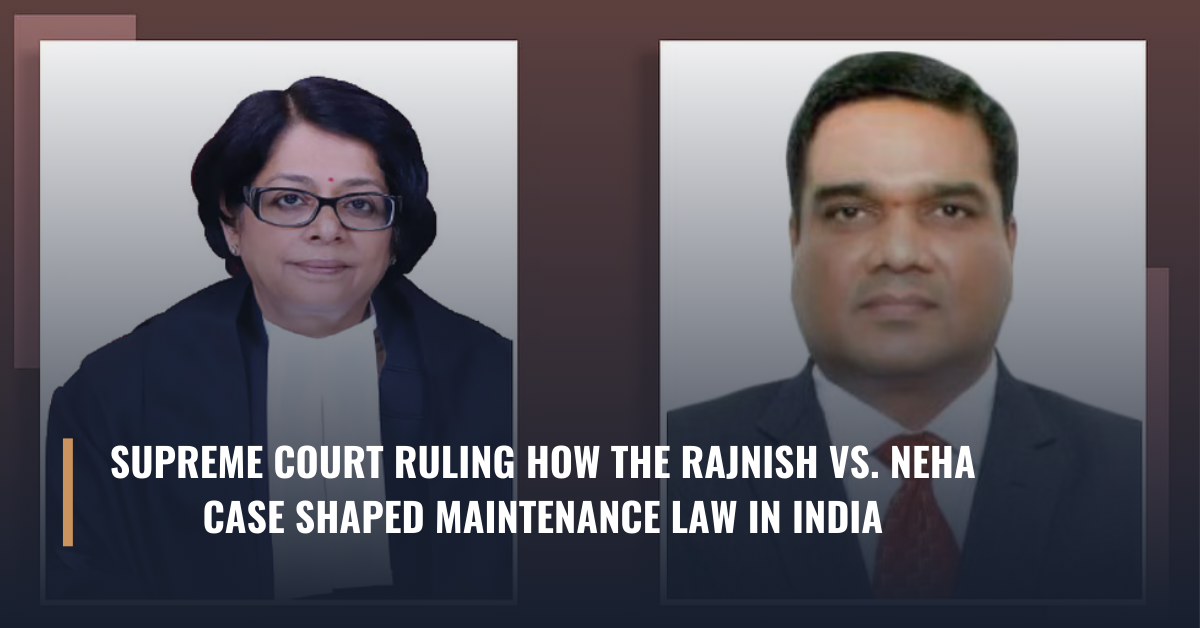Table of Contents
Toggle
Supreme Court Ruling How the Rajnish vs. Neha Case Shaped Maintenance Law in India. The Supreme Court’s decision in Rajnish vs. Neha (2021) is notable for its interpretation and application of maintenance laws under Section 125 of the CrPC (Criminal Procedure Code). Here’s a more detailed explanation of the judgment and its broader implications:
Background of the Case
Parties Involved:
-
- Rajnish: The husband, who contested the claim for maintenance by his wife, Neha.
-
- Neha: The wife, who sought maintenance under Section 125 CrPC, alleging that she was unable to maintain herself and was being neglected.
Legal Framework
Section 125 of the CrPC:
-
- This provision provides for the maintenance of wives, children, and parents who are unable to maintain themselves. The objective is to ensure that individuals who are financially dependent on others are provided with adequate support.
-
- The key elements considered include the ability of the claimant to maintain themselves, the financial capacity of the respondent (usually the husband), and the legitimacy of the claims made.
Key Issues Addressed in the Judgment
-
- Eligibility for Maintenance:
-
- Claimant’s Ability to Earn: The Supreme Court emphasized that a wife’s ability to earn does not automatically disqualify her from receiving maintenance. The mere fact that she might be capable of earning is not enough to deny her maintenance. The husband must provide concrete evidence showing that the wife is indeed capable of self-sustenance.
-
- Neglect and Desertion: The Court considered whether Neha’s claim of neglect was substantiated and whether Rajnish’s arguments regarding abandonment were valid. The burden of proof lies on the respondent (Rajnish) to demonstrate that the wife’s claim is not genuine.
-
- Evidence Requirements:
-
- Proof of Financial Status: The Court highlighted that maintenance claims need to be evaluated based on the actual financial situation of the wife and child, as well as the husband’s financial capacity. It is insufficient to make claims without substantial evidence. Rajnish’s assertions needed to be supported by detailed proof of Neha’s earning capacity and abandonment.
-
- Jurisdictional and Procedural Aspects:
-
- Court’s Role: The Supreme Court reaffirmed the role of courts in ensuring that maintenance is granted based on fair and thorough examination of facts. It also clarified that maintenance is a right that is not easily waived and is subject to judicial scrutiny.

Impact of the Judgment
-
- Reinforcement of Maintenance Rights:
-
- Legal Obligation: The judgment reinforces the principle that maintenance is a legal obligation of the husband and should not be denied without substantial proof. It underscores that Section 125 aims to protect vulnerable individuals and ensure their financial security.
-
- Evidence-Based Decisions:
-
- Need for Concrete Proof: The ruling emphasizes the necessity for both parties to present concrete evidence regarding their financial status. The Court’s decision directs that maintenance claims should be adjudicated based on actual evidence rather than presumptions or unverified claims.
-
- Focus on Welfare:
-
- Prioritizing Welfare: The Court’s decision aligns with the broader objective of family law to prioritize the welfare of spouses and children. The judgment reiterates that maintenance should be viewed from the perspective of ensuring that the dependents are not left in hardship.
-
- Guidance for Lower Courts:
-
- Standard of Review: The Supreme Court’s ruling provides clear guidelines for lower courts on how to handle maintenance cases, including the importance of detailed evidence and fair assessment of claims.
Also Read This,
How are International Matrimonial Disputes handled, Particularly regarding Child Custody?
Conclusion
The Rajnish vs. Neha judgment is a significant ruling that clarifies the application of maintenance laws in India. It reinforces the right to maintenance under Section 125 CrPC and emphasizes the need for proper evidence and adherence to legal standards. The case highlights the judicial commitment to ensuring fair treatment and support for financially dependent spouses and children, thereby upholding the principles of justice and equity in matrimonial disputes.

